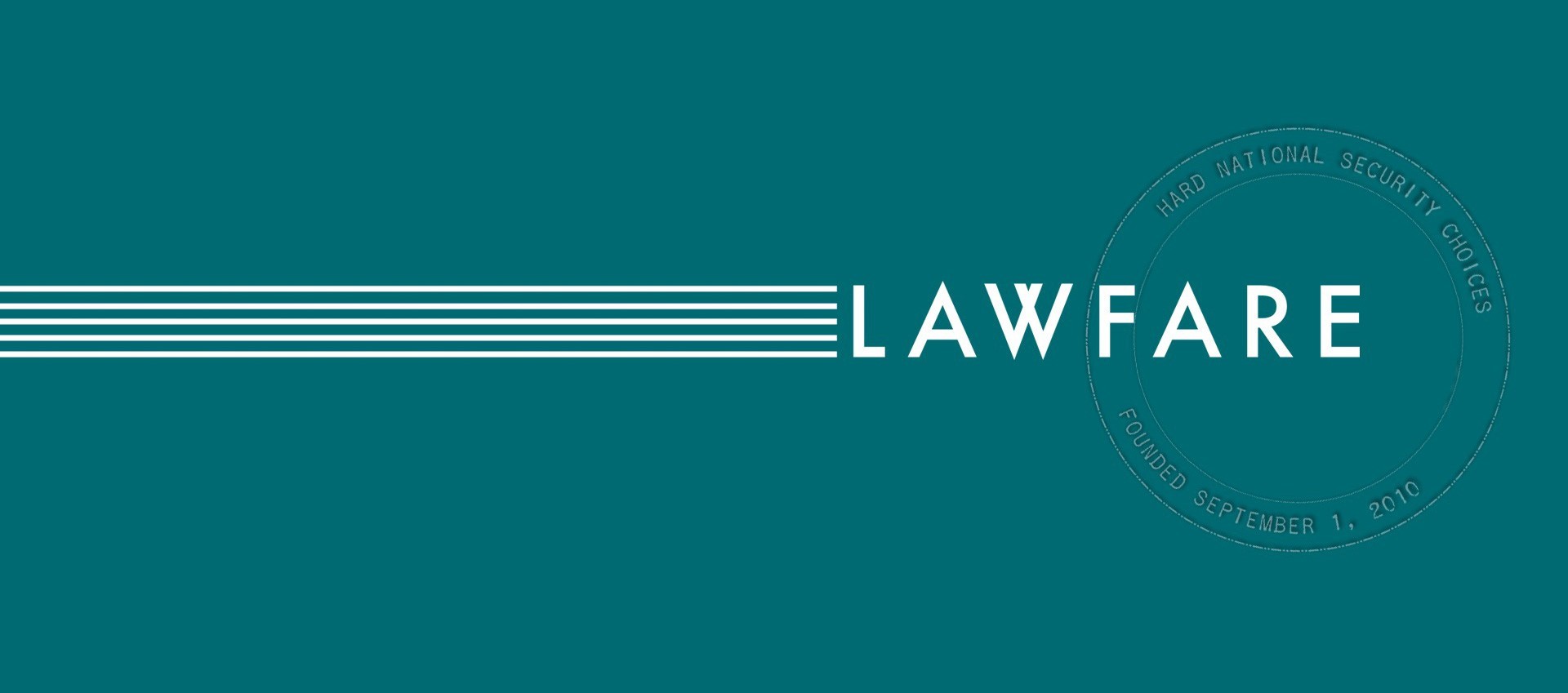The Week That Was: All of Lawfare in One Post

Published by The Lawfare Institute
in Cooperation With

Scott R. Anderson, Anna Bower, Saraphin Dhanani, Natalie K. Orpett, and Benjamin Wittes discussed the new superseding indictment released yesterday in the case of United States v. Donald Trump and Waltine Nauta that names a new co-defendant, Carlos De Oliveira, and adds new charges against the former president and Nauta.
Hyemin Han and Tyler McBrien shared a superseding indictment in the case of United States v. Donald Trump and Waltine Nauta.
Katherine Pompilio shared the Justice Department’s motion for a renewed protective order in the case against Trump, Nauta, and De Oliveira for the alleged mishandling of classified documents at Mar-a-Lago.
On the Lawfare Podcast, Orpett sat down with Brandon Fox to discuss how Trump’s multiple concurrent criminal charges and civil litigations may play out. They discussed the challenges Special Counsel Jack Smith and state prosecutors will likely face, how Trump’s lawyers will leverage those challenges, and what judges are likely to do in response:
John Sullivan Baker and Derek Webber discussed how the U.S. Court of Appeals for the Eleventh Circuit would likely respond if the government appeals Classified Information Procedures Act rulings in its case against former President Donald Trump for his alleged mishandling of classified documents at Mar-a-Lago.
On the Bulwark Podcast, Wittes sat down with Charlie Sykes to discuss a Republican impeachment inquiry against Biden to divert attention from Trump’s crimes, Rudy Giuliani's admittance to making false statements about the 2020 election, Trump’s lawyers’ meeting with Smith, and more:
Peter Margulies discussed a California judge’s ruling, barring a Biden administration policy that limits eligibility for asylum seekers. According to the ruling, the policy conflicts with the Immigration and Nationality Act’s asylum provision.
Anna Hickey and Gia Kokotakis shared the California judge’s ruling blocking the Biden administration immigration policy.
Hickey also shared a civil suit filed by the Justice Department against Texas Governor Greg Abbot (R) for building unapproved floating barriers in the Rio Grande. The suit alleges that Abbott violated the Rivers and Harbors Appropriation Act of 1899 in building the barriers in navigable waters without approval, and the Justice Department requests that Texas remove the structures and all of their related infrastructure.
On the Lawfare Podcast, Kokotakis sat down with Roger Parloff to discuss the Justice Department’s appeal of seven Oath Keepers’ sentences for Jan. 6-related crimes. They covered who the defendants are, how their sentences were calculated, and the Justice Department’s strategic motivations for filing the appeals:
On Rational Security, Anderson and Orpett sat down with Alan Rozenshtein and Quinta Jurecic to discuss the week’s big national security news stories, including the Israeli Knesset’s vote to restrict the courts’ ability to review administrative decisions by the executive branch, the Biden administration’s suit against the state of Texas for installing an unapproved floating barrier across the Rio Grande river, and the Supreme Court’s resistance to stronger accountability measures:
On the Lawfare Podcast, Wittes sat down with Natan Sachs, Amichai Cohen, and Yuval Shany to discuss the passage of the first phase of Israel’s judicial overhaul and the resulting consequences, including mass protests, reservist resignations, and stock market decline:
Hickey shared a court order recently declassified by the Office of the Director of National Intelligence revealing that an FBI analyst ran unapproved searches of a U.S. senator and state senator’s name in June 2022. The search was conducted using data collected by the National Security Administration under FISA Section 702.
On the Lawfare Podcast, Wittes sat down with Joshua Geltzer to discuss the reauthorization battle surrounding Section 702 of the Foreign Intelligence Surveillance Act that authorizes broad intelligence collection against overseas targets using domestic infrastructure. They covered the past problems with Section 702, the reasons the government supports its reauthorization, and the battle ahead between traditional left anxieties about the statute and concerns of the Trumpist right:
Han shared a D.C. Circuit Court decision denying Guantanamo Bay detainee Ali Hamza Ahmad Suliman al Bahlul’s petition to vacate his conspiracy conviction and life sentence reaffirmed by the U.S. Court of Military Commission Review.
Ammar Abdulhamid discussed the United States’s long history of persisting through political and national security crises from the perspective of a former Syrian refugee. He reflects that, in context of how the United States’s 250-year-old system of crisis management has allowed the country’s democracy to endure, the current polarization crisis is not an existential threat.
Ayelet Gordon-Tapiero and Yotam Kaplan discussed how the legal principle of unjust enrichment could be applied to social media platforms as a way to dissuade them from promoting dangerous and harmful content.
Yoel Roth discussed the issues of social media companies’ legalistic approach to trust and safety, arguing in favor of a more human, flexible content moderation strategy.
Ashley Deeks offered a framework to ensure the careful regulation of artificial intelligence (AI) systems developed and used by U.S. intelligence and military agencies. Deeks’s framework is modeled on the covert action statute.
Tom Johansmeyer discussed the debate over cyber’s insurability in the context of the U.S. national cybersecurity strategy. He argued that cyber is insurable, although increased private market capital and a federal cyber insurance backstop are necessary to address major systemic cyber risks.
Wittes, Scott Shapiro, and Sean O’Brien shared the fourth class in Lawfare’s hacking and cybersecurity course, entitled, “Computers & Operating Systems.” They discussed the differences between various operating systems, how to crack passwords using rainbow tables, and more.
In this week’s installment of Lawfare’s Foreign Policy Essay series, Austin S. Matthews discussed the U.S. government’s inconsistency in condemning military coups and identified three statutory issues that must be addressed in order to increase the government’s credibility in its commitment to preserving global democracy: the lack of a statutory definition for “coup,” legislation designating military coups only those against “duly elected” heads of government, and the rigidity imposed on the administration by automatic sanctions.
On the Lawfare Podcast, McBrien sat down with Emilio Peluso and Thomas Bustamante to discuss Brazil’s search for accountability and justice in the aftermath of the coup attempt on Jan. 8, including the electoral court’s ruling, President Luiz Inácio Lula da Silva decision not to rely on the military in his government’s response, and what’s next for Bolsonarismo:
And on Chatter, David Priess sat down with Stephen Dyson to discuss how science fiction helps us understand international relations, politics in famous science fiction series, and more.
And that was the week that was.




